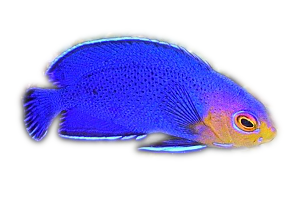
By Bob Goemans

Not Reef Tank Suitable
Likely Fish-Only Tank Suitable
Range: Indo-West Pacific Ocean: Red Sea and South Africa to Society and Pitcairn Islands, north to Southern Japan, and south to southeastern Australia and Rapa Island.
Size: 16 inches (40 cm)
Natural Environment: Inhabits sandy areas and outer reef channels and usually found at depths between 25 – 130 feet (8 – 40 m) where it feeds on small fishes and crustaceans.
General Husbandry: Rarely seen in the trade with juveniles generally having a yellowish body with a wide single lengthwise black or brown line from the snout to the caudal peduncle. As it grows into adulthood, males become green to blue-green with purplish vertical bars on the body and females tend to be darkish brown with white on the trailing edge of the tail.
Best maintained in fish-only aquariums having a fine sand bed, (0.5 – 2.0 mm) and at least 4 inches deep (for juveniles), along with several rocky crevices to hunt and also open swimming areas. Those in this genus will not only rearrange bottom dwelling corals in its search for tasty bottom dwelling invertebrates, as it will eat smaller fishes, snails, tubeworms, sea stars, cucumbers, urchins, crabs, and shrimp that it can find, it will also quickly burrow into the sand bed if frightened or for sleeping at night. This diving into the sand bed will cause clouds of sand particles to be dispensed into the water, and would cause various corals harm, therefore, are not recommended for reef aquariums.
As to diet, products such as marine fish and crustacean flesh, clams, and other marine meaty foods should make up the majority of the juveniles diet and be enriched and chopped into small pieces and fed twice daily.
Taxonomy:
Order: Perciformes
Suborder: Labroidei
Family: Labridae
Genus: Hologymnosus
FYI: Upon first entering the aquarium may stay buried for days. Simply await its decision when to emerge. Once established, it will go to sleep under the sand and arise the next morning at almost the exact same time every day!
Food fish in local areas.
May jump out of the aquarium if frightened!
One male per tank. (Juvenile will eventually turn into a male.)
Experience Level: Intermediate
Temperament: Semi-aggressive
Diet: Carnivore
Coral Safe: Yes
Fish Safe: With caution
Invertebrate Safe: With caution
Acclimation Time: 30 minutes+
Aquarium Environment: Fish-only aquarium
Tankmates: Larger, active and moderately aggressive
Minimum Tank Size: 200 gallons
Temperature Range: 74 - 82°F (23 – 27°C)
Specific Gravity: 1.020 - 1.026
pH: 8.0 - 8.5
 (JR).jpg)
 (RF).jpg)
 (JR).jpg)